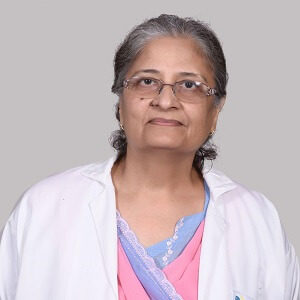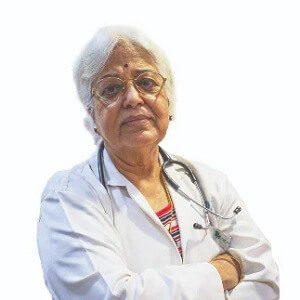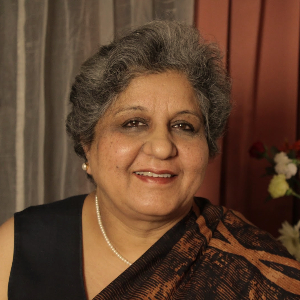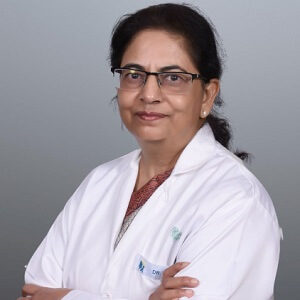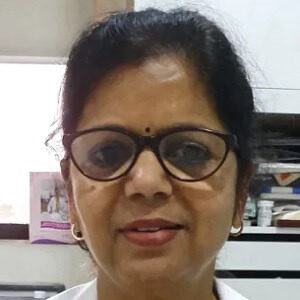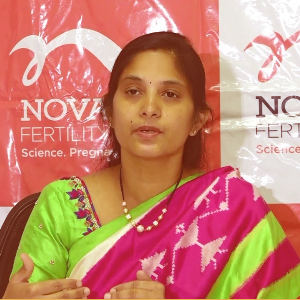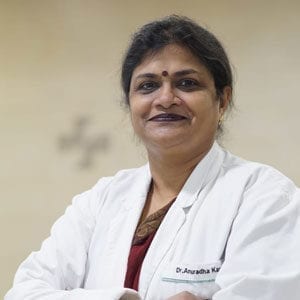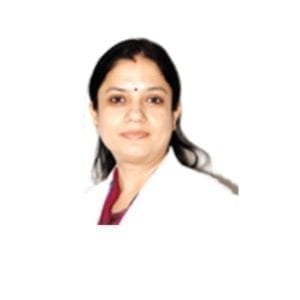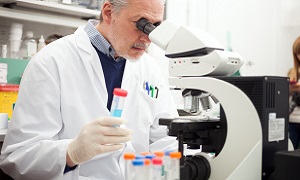Best Doctors in India for Genetic Testing
- Obstetrician & Gynaecologist, New Delhi, India
- Over 40 years’ experience
Profile Highlights:
- Dr. Harmeet Malhotra is one of the best gynecologists in India to consult all major and complex gynecological surgeries, uterine bleeding, and cervical cerclage; in addition to the women’s general health checkups.
- Dr. Malhotra specializes in vaginal, abdominal, and Laparoscopic surgeries, as well as Hysteroscopy. She had her first Hysteroscopic surgery at Apollo Hospitals in New Delhi.
- Obstetrician & Gynaecologist, New Delhi, India
- Over 25 years’ experience
Profile Highlights:
- Dr. Usha Kumar is a veteran Gynaecologist and Obstetrician with over 25 years of proficient experience.
- Having performed over 10,000 surgeries so far, Dr. Usha has also managed to establish herself as a top-notch gynecologist in India.
- Obstetrician & Gynaecologist, New Delhi, India
- Over 55 years’ experience
Profile Highlights:
- Dr. Shakti Bhan Khanna is a well-known obstetrician and gynecologist in New Delhi. She has over five decades of work expertise in academics and this arena.
- A specialized ‘Khanna’s Sling Operation’ technique for Vault Prolapse developed from her Obstetrics and Gynecology experience has received immense success.
- Dr. Khanna is working as a senior consultant at Indraprastha Apollo Hospital and Apollo Cradle & Children’s Hospital since December 1995.
- Dr. Khanna specializes in complex reproductive treatments, gynecological laparoscopy, gyne-endocrinological treatment, infertility and high-risk pregnancies, and pelvic reconstructive surgery.
- Dr. Khanna has delivered many orations and received various felicitations.
- IVF Specialist & Gynaecologist, New Delhi, India
- Over 30 years’ experience
Profile Highlights:
- Dr. Sonia Malik is a renowned gynecologist and obstetrician in India specializing in IVF and ART.
- Dr. Sonia Malik founded the Southend Fertility and IVF Center with the motive of helping infertile couples have a family, and the clinic is considered one of the best in India.
- She holds an extensive experience of 30+ years in Gynecology, Obstetrics, and Infertility and specializes in various types of ARTs including IVF, ICSI, and IMSI. Dr. Malik has performed over 8000 fertility procedures with around 25 IVF cycles and 20 IUI cycles every month.
- Obstetrician & Gynaecologist, Gurugram, India
- Over 26 years’ experience
Profile Highlights:
- Dr. Mukta Kapita has attained expertise in managing high-risk pregnancies, as well as laparoscopic and hysteroscopic surgeries. She also excels in urogynaecological procedures with more than 20 years of experience in this field.
- She has traveled all over the country, and the world, and has been exposed to some of the best equipment and hospitals in this field.
- Obstetrician & Gynaecologist, New Delhi, India
- Over 22 years’ experience
Profile Highlights:
- Dr. Sohani Verma is a well-known Gynecologist and Obstetrician in India, with approximately 22 years of experience in numerous treatments in these disciplines. Dr. Verma serves as a senior consultant at Indraprastha Apollo Hospitals.
- She specializes in infertility and IVF treatments, and she also founded a sperm bank in the hospital in 2002. She has 22 years of IVF and infertility experience in the UK and India.
- Dr. Sohani Verma worked as the Academic Coordinator for the Department of Obstetrics and Gynaecology at Indraprastha Apollo Hospitals in New Delhi.
- Obstetrician & Gynaecologist, New Delhi, India
- Over 35 years’ experience
Profile Highlights:
- Dr. Sushma Prasad Sinha is one of the top Gynaecologists and Obstetricians in India, having over 35 years of experience. She is primarily a well-known name in infertility & IVF with an unrivalled success rate.
- Dr. Sinha specialises in the ovarian cyst, fibroid, endometriosis, and ablation laparoscopic procedures; hysteroscopic surgeries, vaginal surgeries, tubal reconstruction, Colposcopy, loop cone cervical biopsies, and fertility preservation surgeries.
- She works in Indraprastha Apollo Hospital as an obstetrician and gynaecologist.
- Dr. Sushma Prasad Sinha has also written articles for many medical publications and a book chapter titled “Effective Approach to Basic Evaluation of Subfertile Couples.”
- IVF Specialist and Gynaecologist, Hyderabad, India
- Over 15 years’ experience
Profile Highlights:
- Dr. Saroja Koppala is an expert Gynecologist and Obstetrician who is highly trained and experienced in all forms of ART and has helped in achieving a large number of successful pregnancies.
- She received most of her trainings in infertility and reproductive medicine from prestigious fertility clinics in the UK and has also spent a considerable amount of time in practicing at several renowned hospitals.
- Dr. Koppala finds interest in the management of women with recurrent miscarriage, repetitive implantation failure, failed IVF cycles, endometriosis, adenomyosis and low ovarian reserve.
- Obstetrician & Gynaecologist, New Delhi, India
- Over 30 years’ experience
Profile Highlights:
- Dr. Anuradha Kapur is a gynecologist with the experience of around 30 years, who is the director and head of the obstetrics and gynecology department at Max Super Specialty Hospital, New Delhi.
- She is known as one of the best gynecologists, obstetricians, and infertility specialists in Delhi treating patients who have even suffered repeated IVF failures.
- Max Hospital has awarded Dr. Kapur with the Physician Appreciation Award for her efficiency, precision, dedication, and compassion.
- Obstetrician & Gynaecologist, Gurugram, India
- Over 20 years’ experience
Profile Highlights:
- With an experience of 20 years, Dr. Buchun Mishra is a practicing gynecologist, who is proficient in performing gynae surgeries for ovarian cancer, uterine cancer, and cervical cancer.
- She finished her MBBS in 1999 from Veer Surendra Sai Institute of Medical Sciences and Research, Sambalpur, Odisha. She later completed her DNB in 2011 from Army Base Hospital, in New Delhi. In 2013, she completed her fellowship from Rajiv Gandhi Cancer Institute and Research Center, Delhi.
Best Hospitals in India for Genetic Testing
Indraprastha Apollo Hospital, New Delhi
- City: New Delhi, India
Hospital Highlights:
- Indraprastha Apollo Hospital is a 700-bedded multispecialty hospital in the heart of the capital of India. It is a part of Apollo Hospital group, one of India’s most reputed healthcare chains. Indraprastha Apollo Hospital has been accredited by Joint Commission International, making it the first internationally accredited hospital in the country in 2005.
- There are 52 specialties in the hospital with one of the best cardiology centers in the country. The hospital is also equipped with State of the art infrastructure facilities with the largest Sleep Lab in Asia and the largest number of ICU bed facilities in India.
- The hospital also has one of the largest dialysis units in India along with a dedicated Bone Marrow Transplant unit.
- The latest and highly advanced technologies that are installed in the hospital include Da Vinci Robotic Surgery System, PET-MR, PET-CT, Cobalt-based HDR Brachytherapy, Brain Lab Navigation System, Tilting MRI, Portable CT scanner, 3 Tesla MRI, 128 Slice CT scanner, DSA Lab, Endosonography, Hyperbaric Chamber and Fibro scan.
Fortis Memorial Research Institute, Gurugram
- City: Gurugram, India
Hospital Highlights:
- Fortis Memorial Research Institute is a multi-super-specialty, quaternary care hospital with 1000 beds. The hospital comprises reputed clinicians, and international faculty and is also equipped with cutting-edge technology. The hospital is a part of Fortis Healthcare Limited, a reputed chain of private hospitals in India.
- It is a NABH-accredited hospital that is spread across 11 acres of land and has a capacity of 1000 beds. The hospital has 55 specialties and is one of the premier health care centers in the Asia Pacific region popularly known as “the Mecca of Healthcare”.
- The hospital has 260 diagnostic centers and is also equipped with the latest and advanced techniques that include 3 Telsa which is the world’s first Digital MRI technology. The hospital also has world-class Radiation Therapy techniques which have been developed by leading technology experts from Elekta and Brain Lab.
Apollo Hospital, Chennai
- City: Chennai, India
Hospital Highlights:
- Apollo Hospitals, Chennai, is one of the best hospitals for heart care in India. Over the years, Apollo has expanded all over India, as a healthcare chain.
- India’s first ‘Only Pancreas’ transplant was performed in Apollo Hospital. The hospital is known for successfully performing Asia’s first en-bloc combined heart and liver transplant, and over the years, it has attained a remarkable achievement in the global healthcare space. Around 3-4 organ transplants are performed in the hospital per day.
- Equipped with over 500 beds, this hospital in Chennai was established in 1983 and since then has been among the most preferred hospital for patients from all over the world.
- The hospital holds accreditation of the NABH and JCI and is the first hospital in India to be ISO 9001 and ISO 14001 certified. It is also the first South Indian Hospital to receive subsequent reaccreditation from the JCI USA 4 times.
Medanta-The Medicity, Gurgaon
- City: Gurugram, India
Hospital Highlights:
- One of India’s best and largest multi-specialty hospitals, Medanta was built with the aim to bring India to the highest standards of medical care. The hospital has been providing the best medical services to its patients, since its inception, with care, commitment, and compassion.
- Equipped with 1250 beds, the hospital was founded by Dr. Naresh Trehan in the year 2009 with an aim to provide the best medical care at affordable costs. The hospital is spread across 43 acres and includes 45 operation theatres and 350 beds dedicated solely to ICU. The hospital includes over 800 doctors, and more than 22 specialty departments and has a dedicated floor for individual specialty in order to offer the best services under one roof.
- The hospital is considered one of the premier institutes in India for Cardiac Care and includes staffs and members of high caliber. The hospital has 6 distinct centers of excellence.
Max Super Specialty Hospital, New Delhi
- City: New Delhi, India
Hospital Highlights:
- One of the well-regarded providers in India committed to the highest standards of clinical excellence and patient care, Max Super Specialty Hospital is a part of Max Healthcare, which is the second-largest healthcare chain in India. Regarded as one of the most well-regarded healthcare providers in the country, Max Super Specialty Hospital is committed to the highest standards of clinical excellence as well as patient care. The hospital is also equipped with the latest technology as well as cutting-edge research. The hospital is known to deliver and ensure the highest level of patient care.
- The hospital has more than 500 beds and offers treatment for over 35 specialties. The hospital also holds the credit of having installed the first Brain Suite in Asia. This is a highly advanced Neurosurgical machine that allows MRI to be taken while surgery is ongoing.
- Other advanced and latest technologies are also installed in the hospital such as the 1.5 Tesla MRI machine, 64 Slice CT Angiography, 4D ECHO, LINAC, and 3.5T MRI machine.
Artemis Hospital, Gurugram
- City: Gurugram, India
Hospital Highlights:
- One of the most well-known hospitals in the Delhi NCR, Artemis Hospital is the first hospital in Gurugram to get accredited by the Joint Commission International.
- With more than 40 specialties, the hospital has been designed to be one of the most technically advanced hospitals in the country, with the best medical and surgical health care. The hospital has eleven special and dedicated centers, for Heart, Cancer, Neurosciences, etc.
- The latest technologies in the hospital include Endovascular Hybrid Operating Suite and Flat panel Cath Labs for the cardiovascular department, 3 Tesla MRI, 16 slice PET CT, 64 Slice Cardiac CT Scan, HDR Brachytherapy, and highly advanced Image Guided Radiation Therapy techniques (LINAC) are installed in the hospital.
- The hospital has won several awards as well, since its inception.
BLK Max Super Specialty Hospital, New Delhi
- City: New Delhi, India
Hospital Highlights:
- Equipped with 650 beds, BLK Superspecialty Hospital is the largest stand-alone private sector hospital in Delhi.
- With over 1500 healthcare providers and 150 globally renowned super specialists, the hospital is one of Asia’s largest Bone Marrow Transplant Centres. The hospital is known for having some of the best cancer doctors in the country.
- The hospital is NABH and NABL accredited and was inaugurated by the first Prime Minister of India. Pt. Jawahar Lal Nehru.
Gleneagles Global Hospitals, Chennai
- City: Chennai, India
Hospital Highlights:
- Established in 1999, Gleneagles Global Hospital, Chennai, is one of the top healthcare facilities in Southern India. It is part of the Gleneagles Hospital Chain, which is the fourth largest healthcare chain in the country. The hospital specializes in multi-organ transplants of kidneys, liver, lungs, heart, etc.
- The hospital has an excellent infrastructure and state-of-the-art lab and equipment set-up. The hospital boasts cutting-edge technologies, a highly skilled team of doctors and surgeons, and trained support staff. Located in Perumbakam, Chennai, it is one of India’s premier health care destinations. The hospital has performed some of the most complex surgical and clinical procedures in India including multi-organ transplantations.
- The hospital’s lung transplantation program is one of the best in the country. The hospital is known for having performed India’s first single lung transplant and first minimal invasive lung transplant. It is also the only Indian hospital to be associated with King’s College Hospital, London, United Kingdom for liver transplantations.
Fortis Hospital, Mulund, Mumbai
- City: Mumbai, India
Hospital Highlights:
- Fortis Hospital in Mulund is a 315-bed multi-speciality tertiary care hospital with five JCI accreditations that offers a wide variety of diagnostic and therapeutic services. The Fortis Hospital in Mulund delivers patient-centred treatment with cutting-edge technology, highly skilled and experienced surgeons, and paramedical staff.
- This institution houses Maharashtra’s largest multi-organ transplant centre. It is also the first heart transplant centre in western India to conduct 100 or more consecutive heart transplants in under four years. It is the only hospital in the city to have multi-organ transplants and has handled the youngest patient for angioplasty. Fortis Hospital Mulund now boasts the first advanced surgical robot in central Mumbai.
- Cardiology and heart surgery, urology, nephrology, neurosciences, orthopaedics, digestive care, emergency and critical care, and maternity care are among the services provided by the hospital.
Kokilaben Dhirubhai Ambani Hospital, Mumbai
- City: Mumbai, India
Hospital Highlights:
- Kokilaben Dhirubhai Ambani Hospital, Named after the wife of Indian industrialist Dhirubhai Ambani, the founder of Reliance Industries, this is one of the top hospitals in Mumbai. This 750-bed multi-specialty hospital became operational in 2009. Known as one of India’s most advanced tertiary care facilities, the hospital is designed to raise India’s global standing as a healthcare hub, with an emphasis on excellence in clinical services.
- Kokilaben Dhirubhai Ambani Hospital uses Protocol and Care Pathway based treatment models to ensure the best outcomes for patients.
- The hospital represents a confluence of top-notch talent, cutting-edge technology, state-of-the-art infrastructure, and, most importantly commitment.
- The hospital also holds the accreditation of the NABH, NABL, CAP, and JCI.
- The hospital has been recognized as the No. 1 Multispecialty Hospital in Mumbai and the West Zone for the fifth year in a row in 2020 by The Week.
Genetic Testing
Genetic testing is a procedure for examining your DNA. Your DNA is your chemical database which carries instructions for the functions of the body. Genetic testing can reveal any changes in your genes which can lead to any illness or disease.
Genetic testing is able to provide significant information for diagnosing, treating as well as preventing illness, but there are few limitations. For example, for a healthy person, a positive result from genetic testing doesn’t always mean that you’ll be developing a disease. In some other cases, a negative result doesn’t always guarantee that you won’t have any disorder either.
Talking to your doctor, a medical geneticist or a genetic counselor about what you will do with the results is an important step in the process of genetic testing.
Purpose
Genetic testing plays a very important role in determining the risk of developing certain kinds of diseases. It can also play a significant role in screening and sometimes even in medical treatment. There are different types of genetic testing which are done for different reasons:
Diagnostic testing- If you have symptoms of a disease that may be caused by genetic changes, sometimes called mutated genes, genetic testing can reveal if you have the suspected disorder. For example, genetic testing may be used to confirm a diagnosis of cystic fibrosis or Huntington’s disease.
Carrier testing- If you have a history in your family of a genetic disorder, such as sickle cell anemia or cystic fibrosis or if you belong to an ethnic group having a higher risk of a certain genetic disorder, you can choose to have genetic testing before reproduction. An expanded carrier screening test is able to detect genes associated with a wide variety of genetic diseases and mutations. It can also identify if you and your partner are carriers for the same conditions.
Pharmacogenetics- If you have a particular disease or condition, genetic testing can help in determining what medication and dosage will be effective and beneficial for you.
Presymptomatic and predictive testing- If you have a history of a genetic condition in your family, you can get genetic testing before you show any symptoms. This can reveal if you’re at risk of developing that condition as well. This type of test can be useful in identifying your risk of certain types of colorectal cancer.
Prenatal testing- For women who are pregnant, genetic tests can help in detecting any type of abnormalities in your baby’s genes.
Preimplantation testing- Also termed as preimplantation genetic diagnosis, you can consider this test when you attempt to conceive a child through in vitro fertilization. The embryos are screened for genetic abnormalities. Embryos that are without any abnormalities are implanted in the uterus for achieving pregnancy.
Newborn screening- This is a common type of genetic testing. In the US, all states require newborns to be tested for certain genetic and metabolic abnormalities that might lead to specific conditions. This type of testing is important because if a disorder is detected, treatments can begin immediately.
Preparation
Before you go for genetic testing, it is important to gather information about your family’s medical history as much as possible. After this, you need to talk with your doctor or genetic counselor about your personal and family medical history to understand your risk better. You can ask questions as well as discuss any concerns about genetic testing at the meeting.
If you’re getting tested for a genetic disorder that runs in families, you can consider discussing your decision for undergoing genetic testing with your family.
It is also important to note that not all health insurance policies pay for genetic testing. Therefore, you should check with your insurance provider, if you will be covered.
Procedure
Depending on the type of test you are undergoing, a sample of your blood, skin, amniotic fluid or any other tissue will be collected. It will then be sent to a laboratory for analysis.
Blood sample
Cheek swab
For some tests, a swab sample is collected from the inside of the cheek.
Amniocentesis
Amniocentesis is a prenatal genetic test, where your doctor inserts a thin, hollow needle through your abdominal wall and into your uterus for collecting a small amount of amniotic fluid for testing.
Chorionic villus sampling
Chorionic villus sampling is another prenatal genetic test, where your doctor takes a tissue sample from the placenta. Depending on your situation, the sample may be taken with a tube, also known as a catheter or through your cervix or through your abdominal wall and uterus with the help of a thin needle.
Results
The amount of time it takes for you to receive the results of your test can vary. Usually, it depends on the type of test and your healthcare center.
If the results are positive, that means that they detected the genetic change that was being tested for. If you receive a positive test, the steps you need to take will depend on the reason you had the testing.
If the purpose is to:
Diagnose a specific disease or condition, then a positive result helps you and your doctor to determine the right treatment as well as the management plan.
Find out if you carry a gene that can cause any disease in your child, then your doctor, medical geneticist or a genetic counselor can help you determine how likely it is for your child to actually develop the disease. The test results can provide information which you along with your partner can consider when you make family planning decisions.
Determine if you might develop a certain disease, then you need to keep in mind that a positive test doesn’t necessarily mean you’ll get that disorder. For example, having a breast cancer gene doesn’t indicate that you will certainly be getting breast cancer. However, it means you’re at high risk of developing it at some point in your life. However, with some conditions, such as Huntington’s disease, if you have the altered gene it does indicate that the disease will develop eventually.
Talk to your doctor about what your positive result could mean for you. In some cases, you can make certain lifestyle changes for reducing your risk of developing a disease. The results can also help you make choices related to your treatment plan, family planning, careers as well as insurance coverage.
Plus, you may also choose to take part in research or registries related to your genetic disorder or condition. These options can help you stay updated with any new developments in prevention and treatment.
Negative results
A negative result means that a mutated gene was not detected in your test. This can be reassuring, though it is not a 100 percent guarantee that you will not be having the disorder. The accuracy of genetic tests for detecting mutated genes can vary and it generally depends on the condition which is being tested for and whether or not the gene mutation was identified previously in a family member.
Even if you don’t have the mutated gene, this also doesn’t necessarily mean that you will never be getting the disease. For example, the majority of people who develop breast cancer don’t have a breast cancer gene. It is also noteworthy that genetic testing can’t detect all genetic defects.
Risks
There is generally almost no physical risk in genetic testing. However, prenatal testing such as amniocentesis can sometimes have a risk of pregnancy loss, i.e. miscarriage.
Genetic testing can lead to emotional, social and financial risks as well. Discuss the risks as well as the benefits of genetic testing with a qualified doctor, a medical geneticist or a genetic counselor before you go for genetic testing.

